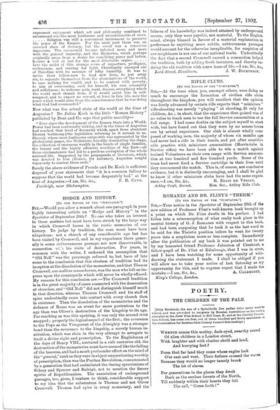HODGE AND HISTORY.
[TO THE EDITOR OF THE "SPECTATOR.") Sin,—Would you allow a remark about one paragraph in your highly interesting article on "Hodge and History" in the Spectator of September 20th? No one who takes an interest In these matters but must have been struck by the large way in which Cromwell looms in the rustic memories of our history. To judge by tradition, the man must have been ubiquitous : not a church of any considerable age but has been visited by Cromwell, and in my experience there gener- ally is some subterraneons passage, not now discoverable, in connection his visits of destruction. For years, in common with the writer•, I endorsed the assumption that "Old Noll" was the personage referred to, but have of late come to the conclusion that this stratum of tradition had its inception at the dissolution of the monasteries, and that Thomas Cromwell, our malleus monachorum, was the man who left an im- press upon the countryside which will never be wholly effaced. My reasons for this conclusion are :—Tbe Cromwell tradition is in the great majority of cases connected with the desecration of churches, and " Old Noll " did not distinguish himself much in that direction, whereas Thomas Cromwell and his staff of spies undoubtedly came into contact with every church then in existence. Then the dissolution of the monasteries and the defiance of Rome was an event far more portentous to the age than was Oliver's destruction of the kingship to its age. Far reaching as was this uprising, it was only the second rivet snapped ; properly the logical sequel of the first; the reverence to the Pope as the Vicegerent of the Almighty was a stronger• bond than the reverence to the kingship, a merely human in- stitution, which was slain in the very attempt to arrogate to itself a divine right and prescription. To the Englishman of the days of Henry VIII., nurtured in a cult centuries old, the destruction of the monasteries must have seemed like the falling of the heavens, and had a much profounder effect on the mind of the "general," sunk as they were in abject unquestioning worship of prescription, than was the Puritan Revolution, consummated by a generation that had assimilated the daring speculations of Sidney and Spenser and Raleigh, not to mention the fiercer spirits of Republicanism. The association of underground passages, too, gives, I venture to think, considerable support to my idea that the substratum is Thomas and not Oliver Cromwell. Thomas had spies in every monastery, and the
fulness of his knowledge was indeed attained by underground means, only they were psychic, not material. To the English mind, always biassed in favour of a material explanation in preference to anything more subtle, subterranean passages would account for the otherwise inexplicable, for suspicion of our neighbours is not one of our national traits. Undoubtedly the fact that a second Cromwell caused a commotion helped the tradition, both by adding fresh instances, and thereby en- duing the old tradition with a new lease of life.—I am, Sir, &c.,










































 Previous page
Previous page